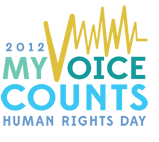The theme of this year’s United Nations Human Rights day – inclusion and the right to participate in public life – is particularly relevant to the issue of caste discrimination. Much more needs to be done to ensure that the rights of Dalits and similarly marginalised groups are fully respected.

In the runup to the annual Human Rights Day today, the Office of the High Commissioner for Human Rights (OHCHR) has launched a series of initiatives to raise awareness of the Day’s theme under the slogan “My Voice Counts”.
This theme is particularly relevant to the struggle against caste discrimination. Three country reports issued on Human Rights Day by the Asian Human Rights Commission (AHRC) document that Dalits are still routinely subjected to social exclusion and limited access to political participation as well as other aspects of public life.
AHRC says that the attempt to redraft the law against caste-based discrimination in India is destined to fail. “In a state where the justice apparatus has fallen, the notion of equality and fair trial has no place”, the report states.
In Nepal, the failure to adopt a new constitution has meant that addressing the issues of the Dalit community has been put on the backburner once more, according to AHRC. “Investigations into cases of caste-based violence are typically slow, biased, and liable to interference by the perpetrators of caste-based crimes”, the report explains.
Prior to Human Rights Day, the International Dalit Solidarity Network urged the UN to be more caste-inclusive to address these concerns. Speaking during a UN social media ”hangout” – a live online video chat – on inclusion and participation of minorities, IDSN programme officer Gitte Dyrhagen Husager recommended that the UN system as a whole address caste discrimination.
“The UN should include it in UN language on par with other prohibitive forms of discrimination,” she said while also urging UN member states and UN experts to promote recognition of caste discrimination as a human rights issue.
In particular, she urged the UN to explicitly include caste-based discrimination in a guidance note on how to tackle racial discrimination and promote minority rights, which is being prepared for the entire UN system. She also made a call to UN Special Procedures to issue a joint statement on caste discrimination.
The Minority Hangout generated considerable activity on Twitter, reaching 1.3 million unique users and creating 4.6 million views. The final hangout in the series of four will take place on Human Rights Day itself and feature the UN High Commissioner for Human Rights, Navi Pillay.
UN website on Human Rights Day 2012
Video from UN ”hangout” session on minorities, 4 Dec
AHRC statement – NEPAL: The slow erosion of democratic institutions hampers accountability
AHRC statement – INDIA: What is the value of rights without justice?
AHRC statement – PAKISTAN: Impunity to perpetrators of human rights violations
IDSN recommendations on inclusion of caste-based discrimination to the UN
IDSN Appeal to UN Member States, Special Procedures, and UN Agencies
